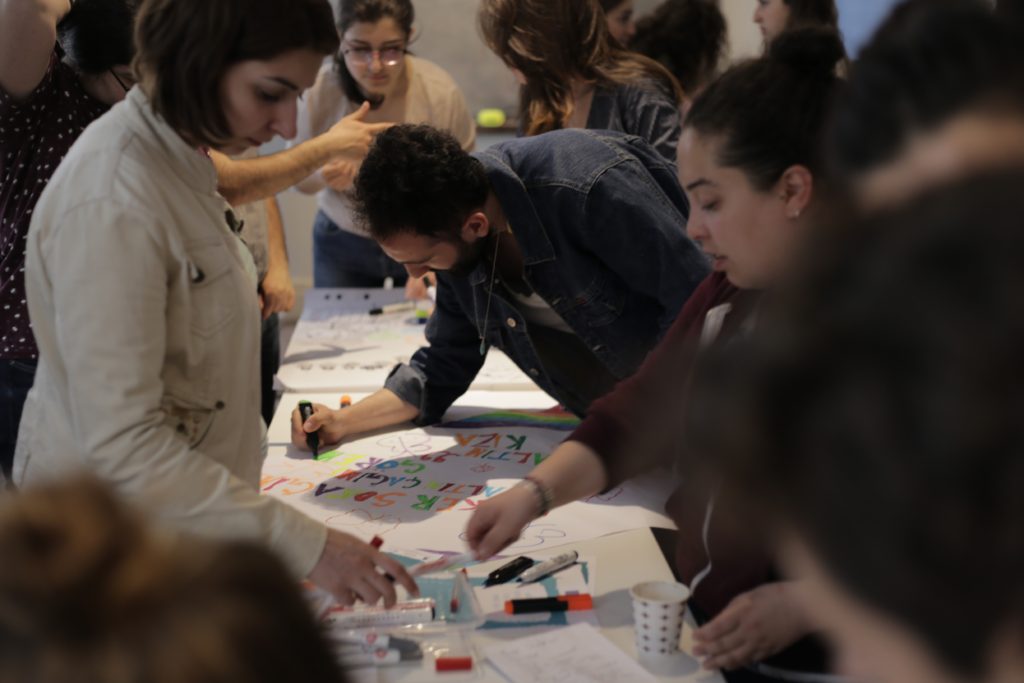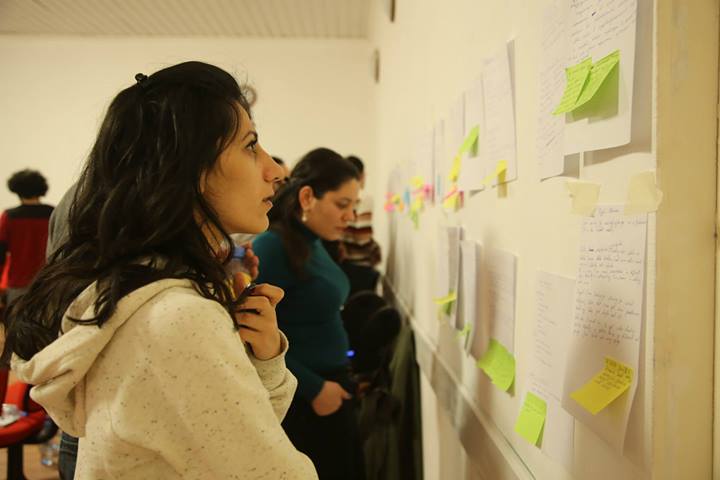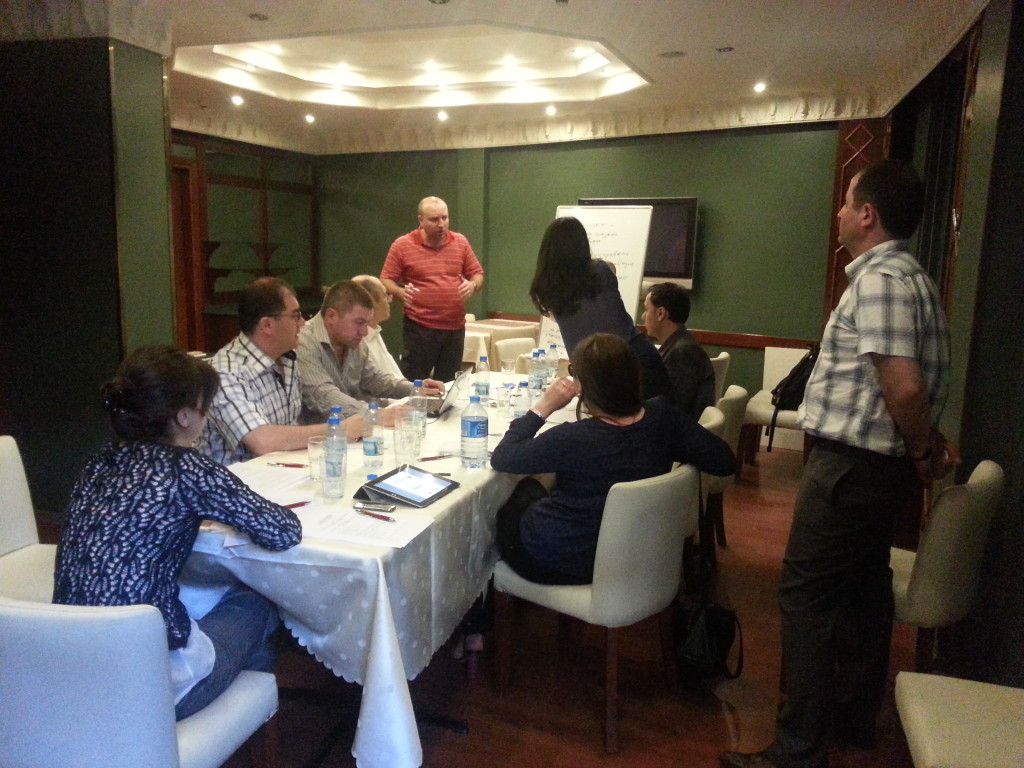Our Methodology
The Imagine Center’s dialogue methodology was born out of the analysis of the collaboration between Turkish and Armenian students and young professionals studying together in Boston who came together on a weekly basis in 2005 and 2006 to discuss sensitive issues concerning Turkish-Armenian relationships in the past, present, and future.
The Imagine Center’s methodology combines analytic problem-solving with narrative mediation and reflective practice. In our workshops, we rely on direct dialogue confronting the past, the present, and the future of the conflict in a belief that the solution to the present and future problems can be found in critically approaching the past.
In practice, four intervention strategies can be distinguished: conflict prevention, conflict management, conflict resolution, and conflict transformation. Conflict prevention is focused on addressing the problems before the conflict escalates and turns violent. Conflict management refers to crisis intervention and mitigating an already violent conflict, without resolving it. Conflict resolution addresses the deep-rooted causes of the conflict and hostility. Conflict transformation is a long-term measure and implies a deep transformation in the societies of their relationship to one another and to the conflict. It lays a foundation for a lasting peace and co-existence. The Imagine programs are an integral part of a long-term conflict transformation effort.
During our programs, participants learn how to manage difficult conversations, how to articulate emotions and vulnerability without confrontation, learn to recognize and address their own triggers and stereotypes, avoid constructing a negative conflict narrative, while building a vision of a peaceful future and strategy to advance this vision.
Different from many conflict resolution projects that deliberately put aside the differences and focus on commonalities, the Imagine Center’s methodology allows the participants to express their differences, understand each other and analyze the root causes of the conflict. Only after working out their differences and developing strong relationships, the participants move on to discussing the areas where they can cooperate.
Dialogues

The Imagine Center’s dialogue methodology was born out of the analysis of the collaboration between Turkish and Armenian students and young professionals studying together in Boston who came together on a weekly basis in 2005 and 2006 to discuss sensitive issues concerning Turkish-Armenian relationships in the past, present, and future.
The Imagine Center’s methodology combines analytic problem-solving with narrative mediation and reflective practice. In our workshops, we rely on direct dialogue confronting the past, the present, and the future of the conflict in a belief that the solution to the present and future problems can be found in critically approaching the past.
In practice, four intervention strategies can be distinguished: conflict prevention, conflict management, conflict resolution, and conflict transformation. Conflict prevention is focused on addressing the problems before the conflict escalates and turns violent. Conflict management refers to crisis intervention and mitigating an already violent conflict, without resolving it. Conflict resolution addresses the deep-rooted causes of the conflict and hostility. Conflict transformation is a long-term measure and implies a deep transformation in the societies of their relationship to one another and to the conflict. It lays a foundation for a lasting peace and co-existence. The Imagine programs are an integral part of a long-term conflict transformation effort.
Training for Journalists

The Imagine Center’s dialogues, trainings, and workshops for journalists establish professional networks of journalists and media actors across conflict divides who, going through joint skill building, exchange of experience, and dialogue, contribute to building alternative discourses in the media that counter the biased coverage of the conflicts. Upon the synchronization of principles and a joint training of trainers, the journalists quite often hold local trainings with colleagues in their local networks familiarizing a wider circle of professionals with the joint learning that they have accomplished.
The most recent projects in the area of media and journalism “Ethical Conflict Coverage in the South Caucasus” and “Fall School and Dialogue for Journalists and Analysts” have mobilized the existing potential of a group of Abkhaz, Armenian, Azerbaijani, Georgian, Osset, and Turkish analysts and journalists bringing them together in the regional online publication the Caucasus Edition – a generator of alternative media coverage, policy analysis, and applied research that sets and advocates for a shared vision, strategy, and action among professional networks, general public, and key actors in the region. To promote multi-perspective discourses in the media and to engage the journalists and analysts in dialogue and regional cooperation, the projects produce and publish two types of products – a set of Parallel Monthly Reviews of local developments and Joint Thematic Research and Policy Papers.
Training for History Educators

Our work with historians and history educators aims to bring about an evolution of the ideological, exclusivist, and conflict promoting approaches to history education and encourage the adoption of modern, conflict sensitive, and inclusive historiography and history education. With these projects, networks of historians are established across conflict divides who identify, address, and work together at ameliorating problems in historiography and history education. For the past years, the Imagine Center has been conducting historiography and history education work in the Armenian-Azerbaijani and Georgian-South Ossetian contexts and is currently expanding to include the whole region of South Caucasus and Turkey.
The working groups of the historians and history educators have come together several times in Tbilisi, Istanbul, and Kiev to jointly learn the modern approaches in historiography and to synchronize methodologies of both history textbook writing and teaching in the classrooms.
Together the Georgian, Armenian, South Ossetian, and Azerbaijani historians and history educators have authored a methodological manual titled “Challenges and Prospects of History Education and Textbook Development in the South Caucasus” that outlines the agreed-upon principles and methodologies. Based on the Manual, the working groups have produced Pilot History Lessons illustrating the application of the methodologies on specific topics. The history lessons have been piloted in schools in various locations and have gained positive feedback both from the teachers and the students alike.
